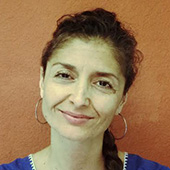Carla García-Fernández

Ph.D. in Curriculum and Instruction, 2014
Growing up, I was taught to embrace my Deaf identity, but my other multiple intersecting identities were not sufficiently understood, and therefore could not be discussed and embraced. As a result, I inevitably faced multiple discriminations. These experiences were particularly painful because I had not nurtured safe space(s) where I could share my experiences and find support. Now, as a teacher and advocate, I realize many d/Deaf children of color share experiences similar to mine. This mindfulness motived me to conduct a study using an intersectionality framework to promote discourse beyond the typical Deaf/Hearing binary. My research allowed me to explore the tangle of identities that exist within this group of people, and the implications of their intersections for d/Deaf individuals of color.
After a lifetime of audism, I had become over-protective of myself as a Deaf individual. I had found few hearing colleagues and faculty who were genuinely willing to unpack their hearing privilege. But, there were a few who were responsive and interested in learning how our society found itself ingrained not just with racism, but linguicism and audism, and understanding the profound impact these prejudices produced in the lives of Signing Community members. And, those few individuals has a profound impact on me. Like a blossoming rose, I found the courage to resist, to speak up, to incorporate my way of knowing as a Deaf Latina, and to tell my story.
Why UT?
The faculty are passionately invested in activism as a social practice in academic spaces, and respect indigenous knowledge systems especially Latina/o and Indigenous cultures and identities. Dr. Luis Urrieta made a profound impression on me and caused me to broaden my academic goals when I first visited the Cultural Studies in Education (CSE) department. Dr. Urrieta also encouraged me to take Mexican American Studies courses where I experienced first-hand the painful process of decolonizing my multiple identities. As is often the case, that pain culminated in a profound turning point in my life. CSE is a unique program where I feel at home. It is filled with caring colleagues and faculty who challenged me to critically explore multiple ways of knowing among marginalized groups. Their encouragement and support have been in stark contrast to the traditional epistemology, and has led to the implementation of Deaf-Latina/o critical theory in education.
Life After UT
The Cultural Studies in Education provided me with foundational knowledge, research tools, and the resources to pursue my role as a community activist and educator in the field of education for d/Deaf children, particularly d/Deaf children of color and other marginalized groups. I aim to push for healthy dialogue on the topic of intersectionality and encourage all to embrace multiple overlapping identities as opposed to singular identity.
Advice for Students
For those prospective students who are passionate about making differences in the lives of students in this competitive and fast-paced society, truth be told, you will find that opportunity in the heart of the Cultural Studies in Education program where you will be challenged to unpack your privileges and re-learn about yourself.

